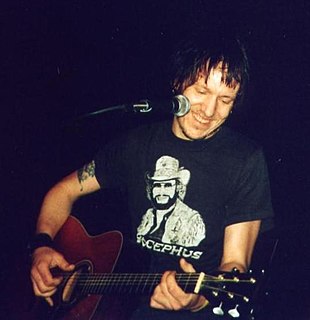A Quote by Helen Garner
I think some people wished I'd kept myself out of the book. But I kind of insist on it because I want the reader to share my engagement with the material, if you like, not pretend that I'm doing it completely intellectually.
Related Quotes
With a 660-page book, you don't read every sentence aloud. I am terrified for the poor guy doing the audio book. But I do because I think we hear them aloud even if it's not an audio book. The other goofy thing I do is I examine the shape of the words but not the words themselves. Then I ask myself, "Does it look like what it is?" If it's a sequence where I want to grab the reader and not let the reader go then it needs to look dense. But at times I want the reader to focus on a certain word or a certain image and pause there.
Write what you want to read. So many people think they need to write a particular kind of book, or imitate a successful style, in order to be published. I've known people who felt they had to model their book on existing blockbusters, or write in a genre that's supposed to be "hot right now" in order to get agents and publishers interested. But if you're writing in a genre you don't like, or modeling yourself on a book you don't respect, it'll show through. You're your first, most important reader, so write the book that reader really wants to read.
Every reader, as he reads, is actually the reader of himself. The writer's work is only a kind of optical instrument he provides the reader so he can discern what he might never have seen in himself without this book. The reader's recognition in himself of what the book says is the proof of the book's truth.
I think, always, with a new book, I get nervous. I think mostly it is because work is really important to me, and a book doing well is important because it buys you another one. Not because of the money but if you keep doing interesting work, work that people like, they will want you to do more, and offers that are interesting come in.
If we continue to fight the National Rifle Association on their home court, which is the legislative front, I think we'll continue to be frustrated. But when you have an ability to go directly to the public, that's a completely different field of engagement, and I think the NRA is not adept at that kind of engagement.
I think I kind of approached music with this sort of, like, weird thing where I kinda set myself up where I could kinda be myself but not really. I kinda had a backdoor out. So if you criticized me, I kinda had my defenses working. And the problem is that some people seize on that as inauthenticity, which is understandable. So that's painful because it's not that you're being inauthentic...there's a difference between being a poseur and being someone who's so emotionally challenged they're kind of just doing their best to show you what they've got.
There are some movies that you feel like doing because of the script. Some because it sounds like fun, some because that's the director you want to work with, some because it's a project that you want to be involved with, and some because you will be paid lots of money. But the bottom line is I must feel like doing it.
If you understand writing as primarily engaging an imaginary reader, well, you've kind of been doing that your whole life. You walk into a room and you're engaging with imaginary strangers because you don't actually know who they are. For me, it was really empowering to say: this is a branch of entertainment and communication and engagement, as opposed to jumping over some perceived literary high bar. That was the buzzkill.
You have to write a book because you believe it has helped you, because you believe it has helped others personally and you are dying to share with it others because you know it will add value to their lives. You write it for them like a gift. You don't want anything from them. You don't want them to do anything for you. You don't even care if they all share the book with their friends, they don't all have to buy them. You're just dying to share this idea with people. Your challenge is to write it in a way that is compelling, enjoyable to read so that they will get the idea.
I've been doing four-track songs by myself since I was like a teenager, where I'd sing in a way that I ... I just didn't think other people would like it, so I didn't play it for them but eventually I got over that, which I'm happy that I did, because it's kind of a drag to be playing a kind of music that you don't really like as much as another kind.







































